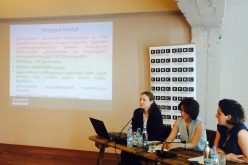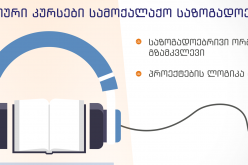On February 23, the EWMI ACCESS Grantee “Economic Policy Research Center” presented results of the project that aimed at helping Georgian farmers and small processing enterprises to comply with DCFTA standards. As part of the project, the Economic Policy Research Center conducted an in-depth analysis of the implementation of several responsibilities undertaken under DCFTA. This included a) the mandatory registration-identification of domestic animals; and b) the state programs for farmers’ assistance and their compliance with DCFTA standards. Based on the analysis, two policy documents were prepared and presented to decision-makers and other stakeholders at a meeting on the 23rd. Key findings and recommendations are the following:
- Explaining the purpose and process of the animal registration-identification, as well as motivating roughly 300,000 households owning up to 1.8 million units of domestic animals is a challenge for the government. Although the government has introduced new legislative regulations in line with the pre-defined schedule, their implementation in practice is being significantly delayed. This is a serious issue as in 2020 these regulations will become mandatory for every household.
- Various assistance programs carried out by the Ministry of Agriculture of Georgia are focused on increasing the productivity and quality of Georgian products in general, which ultimately increases the competitiveness of Georgian products. However, these programs have less emphasis on DCFTA regulations. Georgian households need more targeted assistance in order to comply with new standards such as hygienic norms, packaging and labeling directives, introducing HACCP, and Global Gap standards).
An intensive awareness-raising campaign was held within the project over the past few months. Information meetings were held in 5 regions of Georgia (Kakheti, Samtskhe-Javakheti, Kvemo Kartli, Shida Kartli, and Guria). In addition, local consultation centers in partner CSOs offices were set up and regional coordinators were actively involved in consulting interested farmers. As a result, more than 1000 farmers and producers received comprehensive information on DCFTA directives in these regions. A special guide book for farmers of EU regulations in the agricultural sector was also prepared and disseminated widely. In addition, the Economic Policy Research Center launched the web portal for Georgian farmers (https://georgianfarmers.wordpress.com/) consolidating practical information about DCFTA regulations and instructions. Around 200 articles, blogs and info-graphics were posted on the portal.
The project was funded by EWMI ACCESS.














